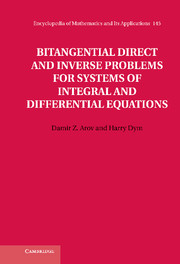Book contents
- Frontmatter
- Contents
- Preface
- 1 Introduction
- 2 Canonical systems and related differential equations
- 3 Matrix-valued functions in the Nevanlinna class
- 4 Interpolation problems, resolvent matrices and de Branges spaces
- 5 Chains that are matrizants and chains of associated pairs
- 6 The bitangential direct input scattering problem
- 7 Bitangential direct input impedance and spectral problems
- 8 Inverse monodromy problems
- 9 Bitangential Krein extension problems
- 10 Bitangential inverse input scattering problems
- 11 Bitangential inverse input impedance and spectral problems
- 12 Direct and inverse problems for Dirac–Krein systems
- References
- Symbol index
- Index
Preface
Published online by Cambridge University Press: 05 October 2012
- Frontmatter
- Contents
- Preface
- 1 Introduction
- 2 Canonical systems and related differential equations
- 3 Matrix-valued functions in the Nevanlinna class
- 4 Interpolation problems, resolvent matrices and de Branges spaces
- 5 Chains that are matrizants and chains of associated pairs
- 6 The bitangential direct input scattering problem
- 7 Bitangential direct input impedance and spectral problems
- 8 Inverse monodromy problems
- 9 Bitangential Krein extension problems
- 10 Bitangential inverse input scattering problems
- 11 Bitangential inverse input impedance and spectral problems
- 12 Direct and inverse problems for Dirac–Krein systems
- References
- Symbol index
- Index
Summary
This book is devoted to direct and inverse problems for canonical integral and differential systems. Five basic problems are considered: those in which an essential part of the data is either (1) a monodromy matrix; or (2) an input scattering matrix; or (3) an input impedance matrix; or (4) a spectral function; or (5) an asymptotic scattering matrix.
There is a rich literature on direct and inverse problems for canonical integral and differential systems and for first- and second-order differential equations that can be reduced to such systems. However, the intersection between most of this work and this book is relatively small. The approach used here combines and extends ideas that originate in the fundamental work of M.G. Krein, V.P. Potapov and L. de Branges:
M.G. Krein studied direct and inverse problems for Dirac systems (and differential equations that may be reduced to Dirac systems) by identifying the matrizant of the system with a family of resolvent matrices for assorted classes of extension problems that are continuous analogs of the classical Schur and Carathéodory extension problems.
In this monograph we present bitangential generalizations of the Krein method that is based on identifying the matrizants of canonical systems of equations as resolvent matrices of an ordered family of bitangential generalized interpolation/extension problems that were studied earlier by the authors and are also reviewed in reasonable detail in the text.
The exposition rests heavily on the theory of J-inner mvf's (matrix-valued functions) that was developed and applied to a number of problems in analysis (including the inverse monodromy problem for canonical differential systems) by V.P. Potapov in his study of J-contractive mvf's.
Information
- Type
- Chapter
- Information
- Bitangential Direct and Inverse Problems for Systems of Integral and Differential Equations , pp. xiii - xivPublisher: Cambridge University PressPrint publication year: 2012
